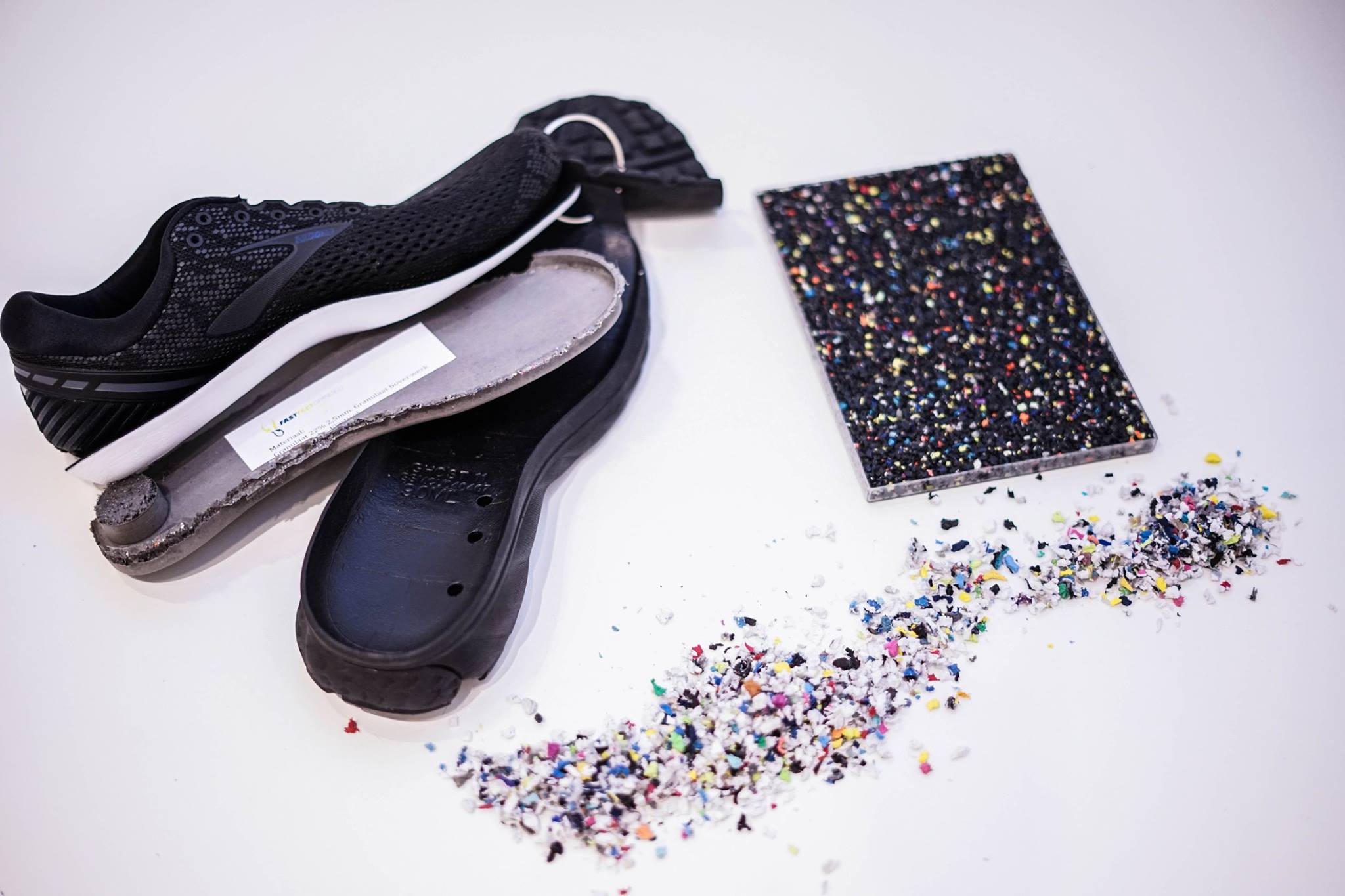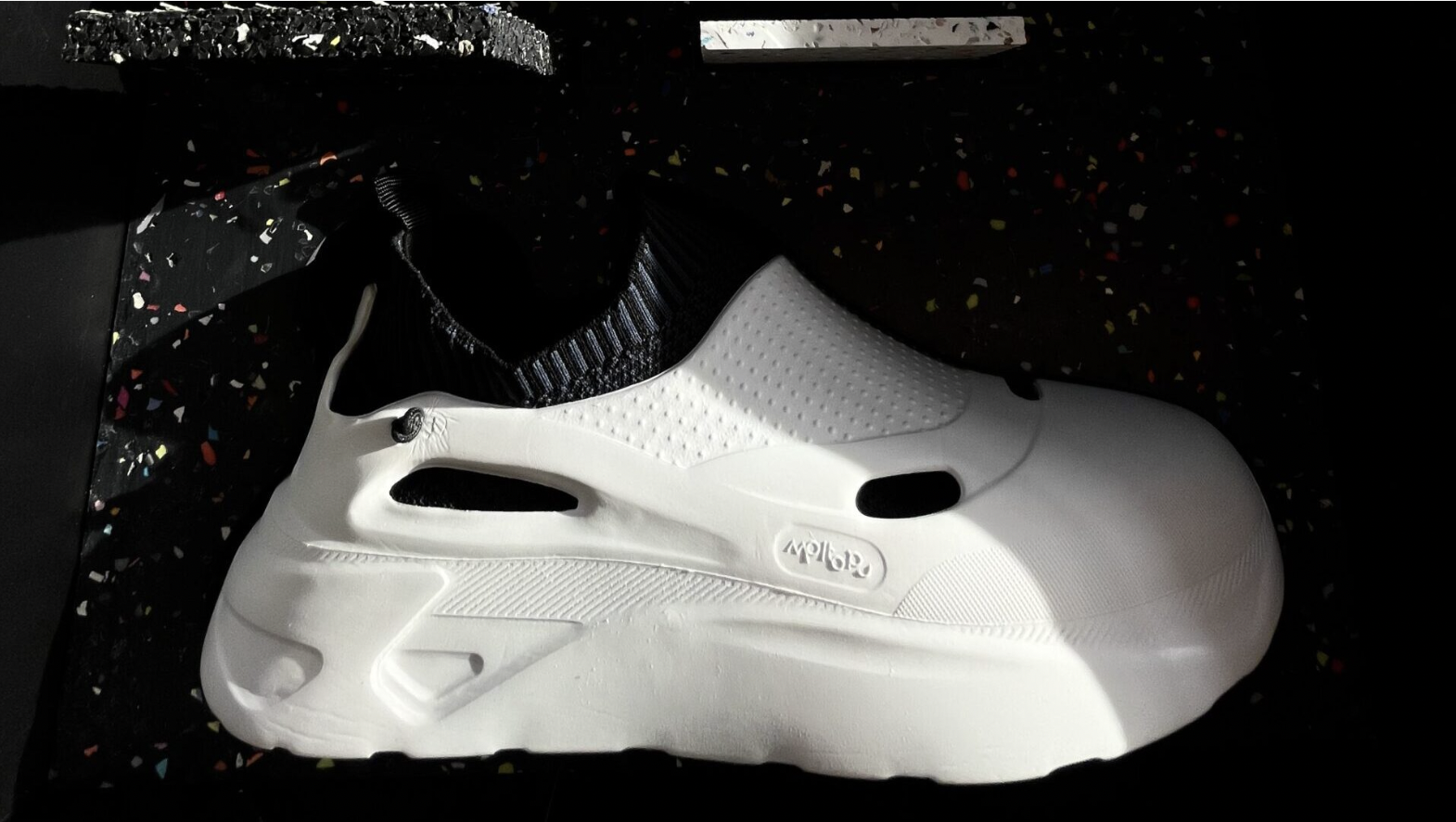
Fast Feet Grinded Collaborative Pilot
The aim of the pilot was to test and validate the FastFeetGrinded footwear recycling process by evaluating the quality of outputs and understanding the environmental impacts of the process. FastFeetGrinded is a company specialising in footwear recycling that accepts all types of footwear as feedstock to produce sorted material granulates with zero waste streams. FastFeetGrinded aims to deconstruct any type of pre- and post-consumer shoe, separating footwear into substituent components, which are then subsequently grinded down and processed to create material streams for repurposed use.
Problem Statement
The fashion and textiles industry has increasingly turned its focus toward circularity, with many stakeholders investing in and working on textile-to-textile recycling. However, the challenge of footwear recycling remains persistent due to its more complex and nuanced process compared to textile recycling. According to estimates, 24 billion shoes are added to the market each year, and a staggering 90% of shoes are either landfilled or incinerated.
Footwear is traditionally made using a vast array of different materials, resulting in design complexity that makes it difficult to recover materials in a technically and economically feasible manner. In addition, the lack of widespread footwear recycling solutions and infrastructure hinders the recovery of footwear products. Therefore, collaborative and innovative efforts are needed to enhance footwear circularity.
Executive Summary
Fashion for Good launched a pilot with partners adidas, Inditex, Target and Zalando, in collaboration with innovator FastFeetGrinded, aiming to test and validate the footwear recycling process and support the uptake of recycled materials in footwear.
Through this collaborative pilot, the partners diverted pre- and post-consumer footwear to FastFeetGrinded, who then processed the feedstock into various new material granulates. FastFeetGrinded and their network of supply chain partners then produced demonstrator output products, such as yarns, socks, sports floor samples, and even a new footwear product. The brands then closely evaluated the products’ quality and purity.
This project is a first in the footwear industry as it allows us to understand the sustainable recycling technologies and infrastructures needed to accelerate the transition towards a circular future. By fostering collaborative partnerships like this, where companies come together to share knowledge and validate innovation, we pave the way for scalable solutions
Goals of the Project
-
Specify input and output products to enable necessary supply chain links for collection, sorting, recycling, and manufacturing
-
Testing FastFeetGrinded’s footwear recycling process and evaluate quality and purity of the outputs produced across various material buckets
-
Validate and produce output products for demonstration using FastFeetGrinded’s network of supply chain partners
-
Conduct a screening LCA on FastFeetGrinded’s process to determine the environmental footprint, from a carbon, water and waste perspective, compared to a defined base case
-
-
Project Results
-
For mechanical recycling of footwear, improvements in the purity of the subsequent output materials are necessary for supply chain re-entry.
-
Sequencing of multiple technologies along the footwear waste supply chain, from waste aggregation through recycling, are key to obtaining high purity outputs that can be integrated into new footwear products.
-
-
-
Innovators
Innovation Partners
Relevant Resources

Key findings from the Fast Feet Grinded Collaborative Pilot

Fashion for Good Partners adidas, Inditex, Target & Zalando Join Forces with FastFeetGrinded for Circular Footwear

Pioneering the Future of Footwear: A New Initiative by Fashion for Good

Fashion For Good Partners With Adidas, On and More Brands to Make Footwear’s Supply Chain More Sustainable
The Amsterdam-based platform for sustainable innovation is rolling out a new initiative designed to help shoe brands and retailers make their sourcing and manufacturing processes more environmentally-friendly.
Other Projects

The Next Stride: Bio-based Materials for Footwear Soles
“The Next Stride: Bio-based Materials for Footwear Soles” aims to validate the performance and environmental impact of bio-based polymers as sustainable alternatives to the fossil fuel-derived materials currently used in footwear soles. The objective is to collectively de-risk the transition to these “next-generation” materials by rigorously testing their technical properties and assessing environmental benefits. Ultimately, the purpose is to accelerate the adoption of these bio-based solutions and pave the way for a more sustainable footwear industry.

Beyond50 Denim: Combining Cottonised Hemp And Green Chemistry
“Beyond50 Denim: Combining Cottonised Hemp And Green Chemistry” aims to validate the performance and environmental impact of cottonised hemp processed with green chemistry to act as a true alternative to cotton in denim applications. The project goal is to evaluate the performance of SEFF’s cottonised hemp fibre in combination with Fibre52’s bio-friendly chemistry solution within denim fabric applications with a total hemp content of 50% and above. The fabrics will be benchmarked against conventional 100% cotton denim with a specific focus on handfeel and aesthetic characteristics.

Price Parity Toolkit
The Price Parity Toolkit (PPT) was designed to help bridge the price gap between next-gen* and conventional materials. Developed by Fashion for Good with the support of Canopy, this industry-supported framework introduces a financing mechanism that decouples price premiums at early stages of the supply chain to enable adoption and drive the scale of lower-impact materials.





